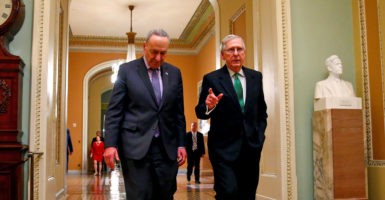The bipartisan budget deal to spend hundreds of billions of dollars over the next two years is worse than you think.
Not only would it bust the budget caps that have long kept federal spending under control. It also would renew a package of expired tax subsidies, marking the return of a corrupt ritual of political favoritism.
The expiring tax subsidies—often referred to by their sanitized name, “tax extenders”—were last extended at the end of 2015 when Republicans claimed that temporary tax policy “ends with this bill.”
For a short few days, the omission of the extenders from the 2017 Tax Cuts and Jobs Act seemed to fulfill that promise. The savings from eliminating the tax subsidies were plowed into lower rates. The ritual extension of narrowly circumscribed tax subsidies had ended.
It seemed to be a small victory over Washington’s most powerful lobbyists, but a victory nonetheless.
Alas, Congress has now decided to resurrect dozens of expired tax preferences for favored industries. If they succeed in renewing the tax extenders, congressional Republicans will collectively trample on the success of their most impressive legislative achievement—true tax reform.
The extenders are largely a subsidy package for the energy industry. Two-thirds of the provisions are energy related. The current proposal would extend special credits to solar lighting systems, fuel cells, geothermal heat pumps, and small wind power, among others.
Also included in the list of things Congress wants to use your money to subsidize: biofuel, rum producers, private railroads, and nuclear power.
Even if you think some of these things might be worthy of support, governments do no service to the industries or technologies they choose to subsidize.
Subsidies for a specific resource or technology end up distorting private-sector investment to align with political agendas rather than market realities. Businesses end up competing for government subsidies rather than your business as a customer.
Strong, viable businesses cannot be created from on high in Washington. The government has a long history of being a poor judge of private market success.
Even to meet the stated goals of promoting investment in their preferred industries, Congress gets the economics wrong. The proposal would retroactively extend 20 temporary tax credits that expired at the end of 2016.
As a matter of investments choices, a retroactive tax subsidy provides no incentive to invest in targeted technologies or locations. Instead, retroactive tax incentives accrue as a onetime windfall to business owners and lobbyists.
The proposed tax extenders are primarily a government transfer to moneyed political interests, lacking the intended effect of incentivizing targeted investments.
As if playing favorites with taxpayer money isn’t bad enough, re-opening the door to temporary tax policy undermines the need to make the newly enacted individual and business tax cuts permanent.
The Tax Cuts and Jobs Act created a bevy of new expiring tax cuts that will also need to be extended to keep taxes from going up on millions of Americans. Without the courage to make the good tax policy permanent and let the bad expire, America could face a nearly annual threat of massive tax increases if Congress turned the income tax cut into a temporary extender.
Temporary tax extenders are the posterchild for America’s dysfunctional tax code. They mask the true cost of what are in effect permanent policy features and give politicians an opening to request patronage from special interests on a semiannual basis.
Creating a new precedent for short-term tax extensions will increase economic uncertainty, distort family and business planning, and slow economic growth because people need policy certainly to make long-term investments.
Congress should allow all 35 tax extenders to expire. Future legislation should scrub the tax code of all subsidies for privileged interests and permanently extend a majority of the tax cuts contained in the Tax Cuts and Jobs Act.


























